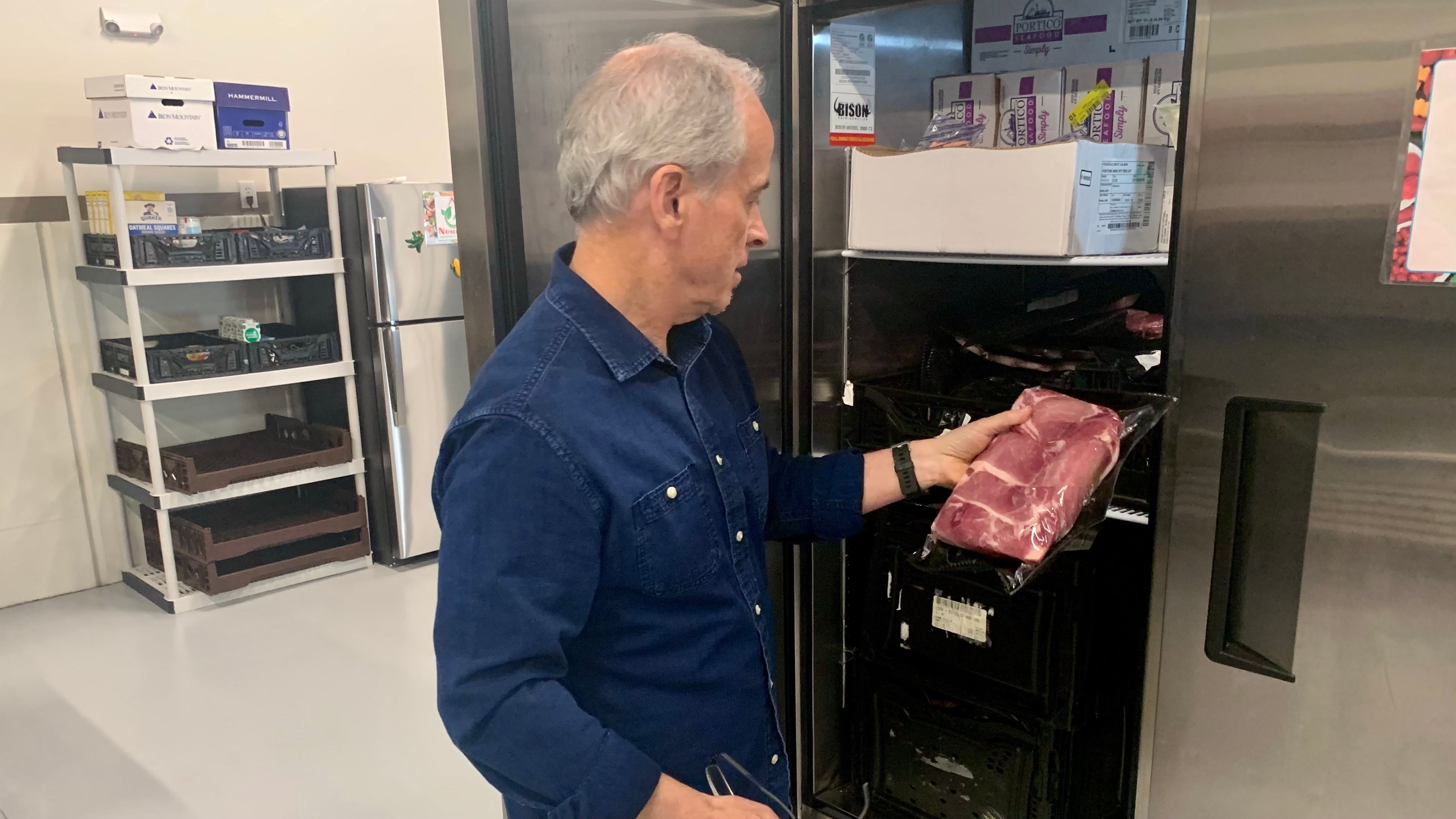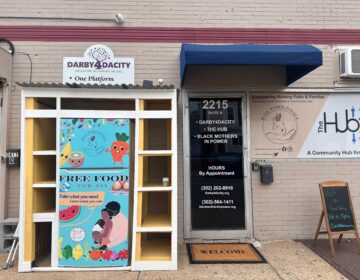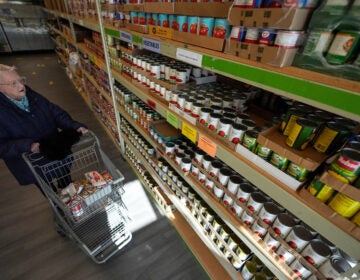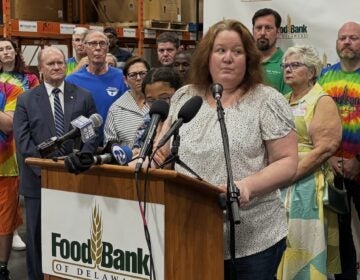‘Food is medicine’: Healthy food from Delaware charity could see cuts amid federal funding freeze to food aid
Food banks in Delaware are trying to keep feeding needy residents after the Trump administration froze millions in food assistance to states.
Listen 1:48
Wilmington resident Sandra Way studies the menu of fresh fruits and vegetables she can pick up at Lutheran Community Services' food pantry. (Sarah Mueller/WHYY)
From Philly and the Pa. suburbs to South Jersey and Delaware, what would you like WHYY News to cover? Let us know!
“Milk, meat, I’ve gotten eggs here,” said Wilmington resident Sandra Way. “I don’t know what I’d do without it. Really and truly.”
The 80-year-old said she needs the weekly food assistance distributed by Lutheran Community Services because her Social Security check only stretches so far. But LCS and other food pantries could face painful cuts after the federal government slashed hundreds of millions of dollars in funding for food assistance.
‘Food is medicine’
LCS cares about giving people nutritious food, said Rob Gurnee, executive director. Its mission is to bridge the gap between food insecurity and nutrition insecurity.
Walking through LCS’ main food warehouse facility in Wilmington, there are refrigerators full of locally sourced meats, vibrantly colored fruits and boxes of eggs from area farms.

It gets food for its clients through the Food Bank of Delaware, the U.S. Department of Agriculture, local farmers, purchased food and donated food.
The nonprofit has a network of food pantries and a nutrition program, the Delaware Food Farmacy Program, operated with the ChristianaCare health care system. It provides medically tailored groceries for people with certain medical conditions, including congestive heart failure, hypertension and uncontrolled diabetes. The program expanded last year to pregnant women who are obese, living in food deserts and patients of ChristianaCare. In 2024, the food pantries served more than 51,500 people and LCS delivered 2,829 groceries to patients.
Funding cuts
But those programs could be in danger because of recents cuts by the Trump administration.
One of its suppliers, the Food Bank of Delaware, is now short nearly a million meals from the USDA meant for Delawareans after the Trump administration froze funding to the fiscal year 2025 Emergency Food Assistance Program. The meals totaled 29% of all food it was expecting from the UDSA, totaling 19 shipments.
“As a major hunger relief partner of the Food Bank [of Delaware], we rely on the food that they’re able to obtain, and they pass that along to us, and undoubtedly it’s going to impact the quality of food and the amount of food that we get,” Gurnee said.
The USDA also recently canceled grants that allowed schools, nonprofits and food pantries to purchase food from local farms. Delaware got a total of nearly $2 million from the Local Food Purchase Assistance Program for fiscal years 2023 and 2024. LCS received $500,000 from the grant to buy locally grown food from farmers for the Farmacy program and food pantry clients.

Gurnee said helping people improve their diet positively impacts health outcomes.
“We’re seeing reductions in weight and [body mass index] and [blood sugar levels], solid health metrics,” Gurnee said. “So, food is medicine, literally, and our farmers in this program were providing that medicine for us.”
A USDA spokesperson said that it is returning to its core mission of strengthening food security, supporting agricultural markets and ensuring access to nutritious food, not funneling money into short-term initiatives.
“The COVID era is over — USDA’s approach to nutrition programs will reflect that reality moving forward,” the USDA’s statement said.
Impact of the cuts
Food banks continue to see high levels of need, even as pandemic-era programs wind down. A 2024 report from Feeding America, a nationwide network of food banks and food pantries, shows that nearly 12% of Delawareans went hungry in 2022. That’s up from about 10% in 2021.
“The economy has really impacted a lot of people, so it really couldn’t come at a worse time,” said Kim Turner, a spokesperson for the Food Bank of Delaware.
Gurnee said the nonprofit will do what it can to meet the needs of its clients while fulfilling its mission of providing healthy food.
“It’s going to be a struggle,” he said. “We’re going to have to do our best to purchase food on our own, but we will likely not be able to purchase in the amount that we were able to receive through this grant. And so for our pantry clients, they’re going to see possibly a lesser-quality food.”
The cuts could also impact the pantries LCS stocks at The Bayard School and Stubbs Early Education Center in the Christina School District, and Harlan Elementary School in the Brandywine School District.
Monica Moriak, a member of the Christina school board, said she’s concerned the funding freeze could impact the supply of products available at schools.
“Students may then even have less food or no food available evenings and weekends,” she said. “It’s also the increased level of stress in their families, because now you’ve got parents who are now cutting back on whatever they might eat to make sure their children eat something.”
Farmers will soon be delivering fruits and vegetables to Lutheran Community Services. First up are green asparagus and red strawberries. But the money from the federal government runs out at the end of July. So the organization will either have to write a check for those tomatoes, carrots and bell peppers or go without them.
This story was supported by a statehouse coverage grant from the Corporation for Public Broadcasting.

Get daily updates from WHYY News!
WHYY is your source for fact-based, in-depth journalism and information. As a nonprofit organization, we rely on financial support from readers like you. Please give today.









